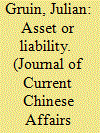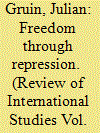| Srl | Item |
| 1 |
ID:
127619


|
|
|
|
|
| Publication |
2013.
|
| Summary/Abstract |
China's financial system, dominated by the banking sector, has played a central role in the development of an imbalanced trajectory of economic development and growth. As one of the primary mechanisms for implementing decisive macro-economic policy, the banking sector has hitherto served the Chinese growth strategy well in actively allocating capital towards the investment and export sectors, whilst proving capable of managing the macro-economic ramifications of this highly inter-ventionist strategy. However, the role of the financial system in this growth strategy is also rooted in the requirement that authority over financial capital remains closely tied to state institutions and policies, due to elite concern over politico-economic instability. Based on policy analysis and qualitative interviews conducted in mid-2012, the article suggests that whilst the structure of the financial system was conducive to fostering the growth of the real economy, it will hold back not the need for rebalancing, but rather the process of rebalancing itself.
|
|
|
|
|
|
|
|
|
|
|
|
|
|
|
|
| 2 |
ID:
108510


|
|
|
|
|
| Publication |
2011.
|
| Summary/Abstract |
A central concern of critical theory is that of how the forces of Modern reason cause certain logics to become reified in the name of rational progress. Two such logics - the ongoing spread of liberal capitalism, and territorial particularism - are simultaneously embodied within social institutions such as the World Trade Organization (WTO) that regulate the global economy, a phenomenon that occurs on the premise of maximising global welfare. Building upon a critical reading of Jürgen Habermas' theory of communicative action, this article undertakes an empirical immanent critique of the extent to which such logics repress the possibility of normative imperatives being considered within agricultural trade negotiations. Specifically, it argues that the dialectic of functionalist and communicative rationality, operating as a theoretical heuristic, reveals that the DDA is susceptible to an ethical indictment that arises from its inability to countenance the alternatives to the dual logics of neo-liberalism and state-interest that could otherwise emerge from a free and rational discussion. The nature of the WTO as a site of social action is revealed to be that of a closed epistemic community in which important normative claims are repressed, and as such, one in which the underlying rational bases for communication are fundamentally distorted.
|
|
|
|
|
|
|
|
|
|
|
|
|
|
|
|